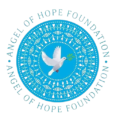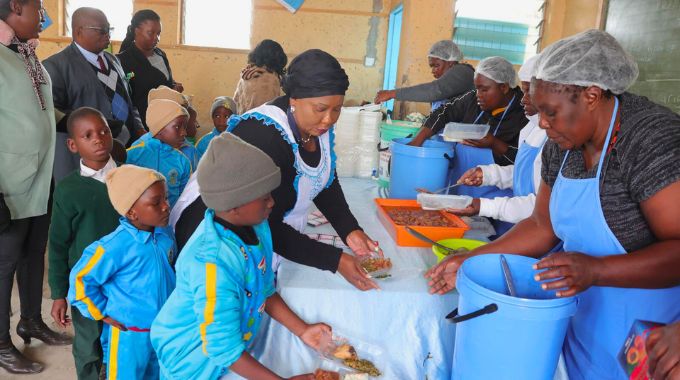First Lady’s school feeding programme
Tendai Rupapa
HUNDREDS of primary school learners from Epworth, Mabvuku and Tafara were on Friday treated to hot meals, courtesy of First Lady Dr Auxillia Mnangagwa’s school feeding programme designed to ensure they are well-nourished and free to pursue their education without challenges.
The mother of the nation launched the programme in 2020.
Amai Mnangagwa, together with women from surrounding communities, prepared sadza, beef stew, roast chicken, sugar beans and dried vegetables in peanut butter which they served the children.
The learners were also given juice and water.
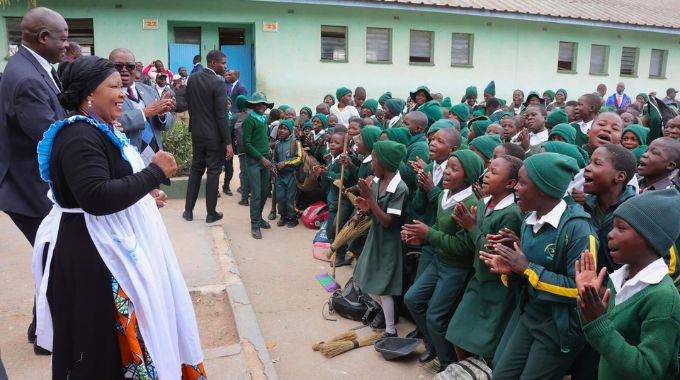
The aim of the initiative is to provide balanced meals to children to increase their school performance and not drop out of school.
The feeding programme is complementing Government’s efforts.
Dr Mnangagwa routinely gives the children countrywide traditional meals, which are famed for their high nutritional value and medicinal properties.
The First Lady also held an interactive session with the learners, their parents and members of the community during which she emphasised the need for children to abstain from drugs and focus on their education.
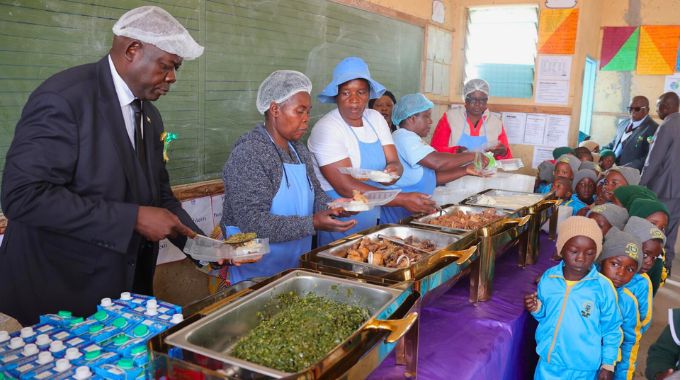
The programme was held at Domboramwari Primary School.
“It is my pleasure to be with you here in Epworth. This is not my first time here as I always come with different programmes. Today, I am focusing on healthy eating. I want to thank the Ministry of Primary and Secondary Education because the Government has its own feeding programme, but in my capacity as a mother, I bring something different like blackjack, cowpea leaves, sugar beans and other traditional meals. These are vegetables that I dry for future use like now when we are wading through a drought season, where most of our crops did not do well. These dried vegetables will sustain us.
“Nowadays, our children are malnourished yet in the past our ancestors were healthy because they consumed traditional healthy food. Back then, there were no hospitals, hence they consumed tree leaves, roots and barks that were medicinal. They preserved their trees and plants; therefore, we should do the same and avoid cutting down trees. Our food is healthy and medicinal. It also enriches our skin because it’s a balanced diet. Women out there, let us prepare traditional food for our children, adding peanut butter in vegetables sometimes. I will come back with another programme for women, focusing on traditional food and how the dishes are prepared,” she said to applause.
Turning to the learners, the First Lady sought to know how they ensure they remained healthy and what good health meant.
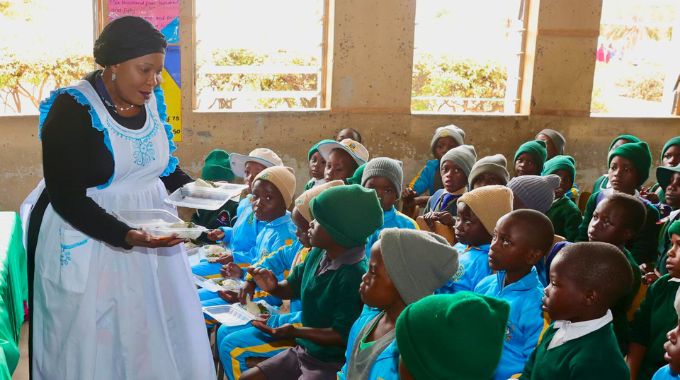
In response, the schoolchildren said food defined one’s health.
Sandra Chaitezvi, a Grade Two learner, drew laughter when she said being healthy meant taking sadza and chicken.
Asked which type of sadza, she quipped: “White sadza.” “What about sorghum sadza? Do you know it?” the First Lady asked.
“No, I know white sadza, which my mother always cooks at home,” she responded.
Her colleague said: “Myself, I want clean food.”
The First Lady asked parents what the child meant by clean food and a parent responded: “Cooking at a clean place, using clean pots and utensils, while the cook is also smart.”
Gogo Agnes Tapfumanei said she threw her weight behind traditional food.
“I am in support of the First Lady’s vision for people to consume traditional food. Even at my own home, I give my grandchildren sorghum and millet sadza, cowpeas, mifushwa yakasiyana-siyana. They demand rice and macaroni daily, but I always put my foot down and also give them traditional food, not Western dishes all the time,” she said.
Amai Mnangagwa said parents needed to lead by example by also taking indigenous dishes.
“As parents, if we do not like our traditional food, even our children won’t embrace it Therefore, as parents, let us prepare and eat traditional food,” she said.
Mrs Irene Mbeve said she grew up eating traditional food, which was healthy.
“As we grew up, we took mangai, mutakura and maheu to school but nowadays, our children frown at these in favour of snacks, which have no nutritional value,” she said.
The First Lady asked the children whether they were well-behaved.
“Are you looking after yourselves because today’s youths are now very naughty. What does being well-mannered mean?” she asked.
In response, the children said it meant not being involved in mischief.
One of them said: “It means we respect the don’t-touch areas.”
The mother of the nation then asked if the children knew the “Don’t Touch” song which prevented them from sexual abuse, whereupon the children burst into the song: “Apa pangu, don’t touch, pane jeri, don’t touch.”
The First Lady advised the learners to report to elders if someone touches their “don’t-touch parts”.
“What of drugs? Who is taking drugs and what are the immediate examples of drugs?” she asked further.
In response, the learners cited dombo, twumbwa, guka and mbanje as examples of drugs.
“Some of the schoolchildren are taking drugs because of peer pressure,” one of the young learners told Dr Mnangagwa.
“Some of those in secondary school beat up and insult their parents after taking guka and they must be arrested,” she continued.
Another learner said: “Some learners bring bronco in satchels and they move with trousers dropping while others are smoking mbanje.”
The First Lady asked if the children knew where drugs were sold and gave them her 575 toll-free call centre number and urged them to call and report the culprits.
The children demonstrated how a sloshed person behaves and told the First Lady that it is called “kustika”.
The First Lady reinforced her call against drug and substance abuse.“We say no to drugs. This destroys your life and your future. Utilise 575 and report the cases,” she said.
Minister of Primary and Secondary Education Dr Torerayi Moyo spoke glowingly about the First Lady’s initiative.
“As an AU (African Union) member state, Zimbabwe has committed itself to implementing a home-grown school feeding programme. The significance of this event today is very much in line with the commitment made by our Head of State, Dr Emmerson Dambudzo Mnangagwa, at the United Nations Transforming Education Summit in 2022. One of the commitments that Zimbabwe is working on following the summit is the provision of school meals as a strategy for enhancing learning outcomes, health, as well as social protection,” he said.
“I also wish to highlight that as Zimbabwe moves forward in addressing the food insecurity challenges brought about by the El Niño-induced drought, the importance of providing meals to all day scholars has been further highlighted and efforts are underway to ensure that every pupil from ECD (early childhood development) A to Upper Sixth enjoys at least one hot balanced meal every school day. I am very happy to tell you all that the Government of Zimbabwe, through the Ministry of Finance, Treasury, has a budget for the school feeding programme and this budget has appeared every year since 2018. Amai, we wish to thank you for the work that you do. Today we saw you feeding all the children gathered here. This shows that you are a mother of the whole nation, who has love for her children. ‘‘
This year is a difficult one because of drought. We have a loving mother, who comes to feed her children. We thank you, our mother.”
In a speech read on his behalf by his Permanent Secretary Mr Cosmas Chiringa, Harare Metropolitan Provincial Affairs Minister Charles Tawengwa thanked the First Lady for her well-meaning initiatives.
“Amai, we truly appreciate your presence here today and your ongoing efforts to create the vital initiative that aims to enhance nutritional support for our schoolchildren. This feeding programme, which you started, Your Excellency, embodies a commitment to ensuring the wellbeing and development of our future generation. Through your vision and dedication, Your Excellency, this feeding programme addresses the challenges and provides our schoolchildren with the nourishment they need to thrive. By ensuring that every child has access to a balanced and healthy meal during a school day, we are not only meeting their immediate nutritional needs, but also investing in their long-term success,” he said.
“Your Excellency, I am proud to report that since the inception of this programme, we have witnessed tangible improvements in the health and academic performance of our students. By receiving proper nutrition, they are better equipped to focus in class, engage in learning activities and reach their full potential. I urge all stakeholders, including parents, teachers, community members, Government officials and development partners, to join hands in ensuring the success and sustainability of this initiative started by the First Lady of the Republic of Zimbabwe, Dr Auxillia Mnangagwa. Together we can make a difference in the lives of our schoolchildren and pave the way for a brighter and healthier future. Let us continue to prioritise the welfare of our youths by investing in their nutritional support for the betterment of our society as a whole.”
The event was also attended by other Government officials, including Deputy Tourism and Hospitality Industry Minister Tongai Mnangagwa. – Sunday Mail
